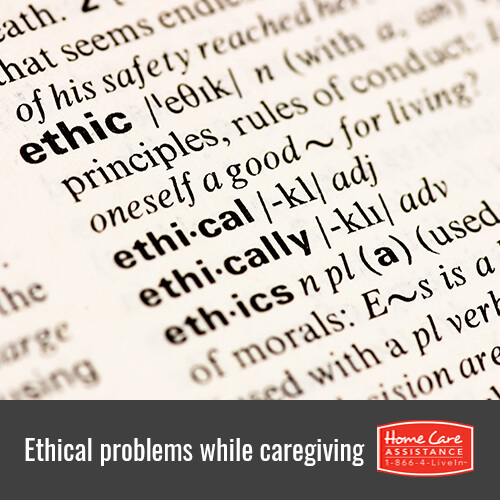Ethical issues frequently arise when providing Anchorage home care for a senior with dementia. Although you want your elderly loved one to make independent decisions as much as possible, there will be times when you must step in to protect his or her wellbeing. Planning for these common ethical dilemmas now can help both you and your loved one prepare for the future.
Diagnosis Disclosure
Families often debate how much they should tell their loved ones about their health conditions. As a general rule, it is better to be honest with your loved one about his or her dementia diagnosis and answer questions truthfully. However, it is best to focus on the positive points and avoid mentioning details that could cause your loved one to feel despair. By being honest now, seniors in the earliest stages can be involved in the planning for long-term dementia care in Anchorage.
Financial Management
Finances can be a sensitive topic for many families, but dementia can cause seniors to take financial risks that place their wellbeing in jeopardy. If you notice your loved one is forgetting to pay bills, overspending, or falling victim to scams, it may be necessary to have someone else manage his or her accounts. Appointing a power of attorney as soon as possible after the diagnosis makes it clear who should take over when your loved one needs help with his or her finances.
Health Decisions
Dementia treatments can vary according to the stage your loved one is in and the options his or her medical facility provides. Your loved one may also develop new conditions that require health care decisions. When possible, involve your loved one in the decisions regarding treatments. It can also be helpful to rely on the advice of your loved one’s medical team and other family members involved in his or her care.
Independence Protection
Dementia is a progressive disease that slowly takes away certain abilities, and it can be difficult to remove privileges that help your loved one remain independent. Fortunately, there are options for easing the transition. For example, transportation arrangements can allow your loved one to go places when he or she can no longer drive. By finding new ways to help your loved one complete daily routines, he or she will have the necessary support to maintain independence for as long as possible.
Caring for a senior loved one with dementia can be challenging, but you can find the support you need by reaching out to Home Care Assistance. All of our caregivers are trained in the Cognitive Therapeutics Method, an activities-based program designed to slow cognitive decline and delay the onset of dementia. In addition to dementia and Alzheimer’s home care Anchorage seniors and their families can rely on, we also offer comprehensive stroke and Parkinson’s care. For more information and to schedule a free consultation, call (907) 770-0907 today.
